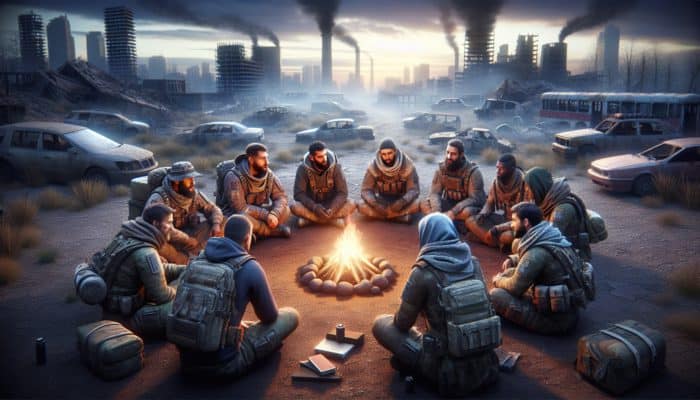Understanding the Crucial Role of Trust in Survival Groups
What Factors Contribute to Building Trust Within a Group?

Trust serves as the fundamental foundation for any successful survival group. When trust is lacking, group members may find it challenging to collaborate effectively, which can severely compromise their chances of success in critical situations. Several key factors contribute to establishing trust within a group, including open communication, consistency in reliability, and a shared vision. Effective communication is paramount; maintaining open channels allows members to express thoughts, concerns, and critical information, fostering a culture of transparency. Reliability plays an equally important role; when members consistently fulfil their commitments, it reinforces mutual confidence. Furthermore, ensuring that group members are aligned around common goals cultivates a sense of unity and shared purpose, which is essential for building trust.
- Open and honest communication
- Consistent reliability in actions and promises
- Shared goals and visions
- Mutual respect and understanding
- Empathy and emotional support
- Active listening skills
- Conflict resolution mechanisms
- Encouragement of vulnerability
Building trust requires intentional efforts and the creation of a nurturing environment where vulnerability is embraced rather than feared. When members feel secure enough to express their thoughts and feelings, trust flourishes, paving the way for stronger group dynamics and enhancing overall group effectiveness.
How Does Trust Influence Group Dynamics?
Trust plays a significant role in shaping how members within a survival group interact, make decisions, and support one another. Groups with high levels of trust naturally display more cooperative behaviour. Trust cultivates an environment where members feel inspired to share their ideas and opinions without fear of judgement, leading to innovative solutions during critical moments. As trust grows, members become increasingly willing to take risks, whether executing a challenging survival strategy or revealing personal vulnerabilities that might affect group cohesion and performance.
In high-trust environments, the decision-making process becomes streamlined, and members are more inclined to participate in constructive dialogue, share responsibilities, and collaborate effectively towards consensus. Additionally, they demonstrate a heightened ability to adapt to unforeseen circumstances, showcasing resilience in the face of challenges. This adaptability is crucial in survival situations, where unexpected developments can quickly derail plans. Consequently, high levels of trust not only enable groups to function effectively but also empower them to flourish even amidst adversity, reinforcing the idea that trust is a pivotal element in group dynamics.
What Is the Role of Trust in Crisis Management?
In times of crisis, trust serves as a vital facilitator for swift and effective action. Groups that possess strong trust can make rapid decisions, mobilise resources efficiently, and implement emergency plans with confidence. Trust fosters open communication, even amidst chaos, ensuring that members can articulate their concerns and insights without hesitation. This open communication expedites the decision-making process, enabling the group to pivot quickly in response to new information or changing conditions.
Moreover, groups that have established a foundation of trust tend to exhibit greater resilience during crises. Members are more likely to provide emotional and psychological support to one another, which is essential for maintaining morale. For instance, during a survival scenario in the wilderness, a robust trust dynamic allows individuals to depend on their partners for both emotional and physical support, ensuring that panic does not overshadow rational decision-making. The ability to rely on one another not only strengthens group cohesion but also solidifies trust as an indispensable resource for navigating crises effectively.
Insights from Experts on Trust in Survival Groups

What Do Experts Say About Trust in Survival?
Experts across various fields consistently emphasise the critical importance of trust in the success of survival groups. According to seasoned survivalists and psychologists, trust significantly enhances group cohesion and overall effectiveness. One notable insight is that fostering open communication is paramount. By cultivating an atmosphere where members feel safe to express their thoughts and concerns, groups can proactively address potential conflicts before they escalate. Mutual respect is equally vital; when individuals value one another’s contributions and perspectives, trust naturally flourishes within the group.
Real-world examples reinforce this perspective: consider a team of wilderness survivalists preparing for an expedition. Those with established trust communicate openly about their skills and limitations, resulting in a well-rounded team capable of tackling the challenges ahead. This level of transparency allows them to strategise effectively, ensuring that each member contributes their strengths to the group’s overall success, ultimately enhancing their chances of survival.
How Can Trust Be Measured in Groups?
Measuring trust within a group can be approached through a variety of methods, including surveys, observational assessments, and performance metrics. Surveys can provide quantitative data regarding members’ perceptions of trust and confidence in one another, while observational assessments offer qualitative insights into group dynamics during interactions. Tracking performance metrics, such as decision-making efficiency and conflict resolution success rates, can also reveal underlying trust levels within the group.
Understanding these trust levels is crucial for enhancing group cohesion and effectiveness. For example, if survey results indicate low trust, leaders can implement targeted interventions, such as team-building exercises or open forums for discussion, to improve the situation. Regularly measuring trust levels allows for ongoing adjustments to group dynamics, fostering a culture where trust can continually develop and thrive, ultimately leading to improved outcomes in survival scenarios.
What Strategies Can Enhance Trust in Survival Scenarios?

Implementing effective strategies to enhance trust within survival scenarios can significantly improve group dynamics and overall performance. Regular team-building exercises are foundational; these activities create opportunities for members to bond and build rapport outside of high-pressure situations. Activities such as problem-solving challenges or collaborative tasks can highlight each member’s strengths and weaknesses, promoting understanding and empathy within the group.
Encouraging honest feedback is another essential strategy. When members feel empowered to share constructive criticism and praise, it nurtures an open dialogue culture, reinforcing trust. Furthermore, establishing clear expectations for accountability creates a framework in which individuals take ownership of their roles. Collectively, these strategies strengthen trust, leading to enhanced performance and cohesion during critical survival situations where teamwork is vital.
What Case Studies Highlight Trust Breakdowns in Survival Groups?
Examining instances where trust has faltered within survival groups offers invaluable lessons regarding the importance of maintaining trust. One notable case involved an expedition team that lost its way in unfamiliar terrain. Initially, trust among the members was high; however, as panic set in, communication deteriorated. Members began to doubt each other’s capabilities and intentions, leading to poor decision-making that exacerbated their predicament.
The consequences were severe; a lack of coordinated efforts resulted in resource mismanagement and heightened anxiety among the group. This case underscores the critical need for trust maintenance, even in high-stress environments. By analysing such breakdowns, we glean insights into proactive measures necessary for preserving trust, such as regular communication check-ins and conflict resolution protocols. These lessons reinforce the understanding that trust is not static; it requires ongoing effort and vigilance to sustain effectively.
Effective Approaches to Building and Maintaining Trust in Survival Groups
What Trust-Building Activities Are Most Effective?
Engaging in effective trust-building activities is essential for fostering strong bonds within survival groups. Activities such as team challenges, trust falls, and role-playing scenarios can significantly enhance members’ ability to rely on one another. Team challenges, including navigating obstacle courses or completing survival tasks under time constraints, strengthen collaboration and highlight each member’s strengths and weaknesses. These shared experiences build camaraderie, which is essential for establishing a solid foundation of trust.
Trust falls are classic exercises that necessitate vulnerability and reliance on peers. By physically demonstrating their willingness to trust one another, members can fortify interpersonal connections. Additionally, role-playing survival scenarios allows group members to practice communication and decision-making in a safe environment, further solidifying trust. Through these activities, members learn to appreciate each other’s contributions, fostering a supportive culture that enhances group cohesion and effectiveness in survival contexts.
How Should Trust Issues Be Handled Within a Group?
Addressing trust issues within a group is a delicate yet necessary endeavour. Open communication is the cornerstone of resolution; members must feel safe expressing their concerns without fear of retaliation. Facilitating a mediated discussion can help clarify misunderstandings and promote healing. Mediation provides a neutral ground, allowing members to voice their grievances and collaborate on solutions.
Restructuring roles may also be beneficial if trust issues stem from conflicting interests or performance discrepancies. By realigning responsibilities with individual strengths, groups can foster a sense of fairness and equity. Proactive measures, such as regular discussions about trust and group dynamics, can prevent erosion before it escalates. Ultimately, fostering an environment where honesty and vulnerability are valued is critical for effectively addressing and overcoming trust issues within survival groups.
How Can Trust Be Maintained Over Time?
Sustaining trust within a survival group is an ongoing process that demands consistent behaviour, transparency, and regular check-ins. Members must commit to being reliable and predictable in their actions, reinforcing the trust they have built over time. Transparency is equally vital; regularly sharing information about group activities, decisions, and individual challenges helps members feel included and valued, further strengthening trust.
Regular check-ins provide opportunities for open dialogue, allowing members to discuss any concerns before they escalate. These conversations can serve as a platform for feedback, fostering an atmosphere of continuous improvement. Long-term trust requires a commitment from all members; by prioritising trust maintenance, groups can thrive in adversity and enhance their overall resilience in challenging situations.
The Significant Impact of Trust on Survival Group Performance
How Does Trust Affect Group Decision-Making?
Trust profoundly influences group decision-making, acting as a catalyst for quicker and more effective outcomes. Groups that operate within a high-trust framework can make critical decisions more confidently and swiftly. When members trust one another, they are more inclined to voice their opinions and share valuable insights, enriching the decision-making process. This collaborative approach often results in well-rounded decisions that consider multiple perspectives, ultimately leading to better outcomes.
Moreover, high levels of trust reduce the friction associated with disagreement. In a low-trust environment, conflicts may arise from differing opinions, resulting in protracted discussions and indecision. Conversely, trusting groups can navigate disagreements constructively, focusing on finding common ground rather than dwelling on differences. This enhanced decision-making ability is crucial in survival scenarios, where timely and effective choices can mean the difference between success and failure for the group.
What Role Does Trust Play in Resource Management?
Trust plays a pivotal role in the fair and efficient distribution of resources within a survival group. When members trust one another, they are more likely to share resources equitably, whether food, tools, or knowledge. This sharing is essential in survival scenarios, where resource scarcity can present significant challenges. Trust ensures that each member feels confident that their contributions and needs will be respected and valued, fostering a collaborative spirit.
Additionally, trust enhances collaboration in resource management. Groups characterised by high trust are more inclined to work together to strategise resource allocation, leading to innovative solutions that maximise available supplies. This collaborative approach not only improves resource management but also fosters a sense of community and shared responsibility, further reinforcing the trust among group members. Effective resource management, underpinned by trust, is vital for the survival and success of the group.
How Does Trust Contribute to Group Resilience in Survival Situations?
Groups that possess strong trust exhibit remarkable resilience in survival situations. Trust enables members to provide emotional and psychological support to one another during challenging moments. When faced with obstacles, trusting groups can maintain a positive outlook, encouraging one another to stay focused and motivated. This emotional support is crucial, as it helps mitigate stress and anxiety, enabling the group to operate effectively and make rational decisions.
Moreover, trust enhances adaptability. In uncertain environments, resilient groups can pivot their strategies and approaches in response to new information or changing conditions. This adaptability is essential for survival, as it allows groups to overcome setbacks and continue moving forward. Ultimately, trust is not just a beneficial trait; it is a cornerstone of group resilience, enabling members to face adversity with confidence and collaboration.
Research-Backed Benefits of Trust in Survival Groups
What Insights Does Research Provide About Trust and Survival?
Research consistently highlights the profound impact of trust on group performance and survival rates. Studies indicate that groups with higher trust levels tend to outperform their counterparts across various metrics, including decision-making efficiency and resource management. Trust acts as a social lubricant, facilitating smoother interactions and fostering a collaborative atmosphere that enhances overall group effectiveness and cohesion.
Furthermore, research underscores the importance of trust in group dynamics, revealing that cohesive teams are better equipped to navigate challenges. These findings reinforce the notion that trust is not merely a desirable trait but a critical factor influencing group outcomes. In survival scenarios, where stakes are high, understanding the research-backed benefits of trust can inform strategies for building and maintaining it effectively.
How Does Trust Correlate with Group Success Rates?
There exists a significant correlation between trust levels and success rates in survival scenarios. Groups characterised by high trust exhibit improved performance across various measures, including task completion, decision-making speed, and resource management. This correlation stems from a trusting environment that encourages collaboration and open communication, ultimately enhancing group efficiency and effectiveness in challenging situations.
Data supports the link between trust and effective group functioning, demonstrating that teams that invest in building trust tend to achieve greater success in challenging survival scenarios. By prioritising trust-building efforts, groups can significantly enhance their chances of success, reinforcing the idea that trust is a foundational element of survival dynamics and group performance.
What Psychological Benefits Does Trust Offer in Groups?
Trust provides substantial psychological benefits that positively impact group cohesion and overall performance. When members feel secure in their relationships with one another, stress and anxiety levels decrease, leading to improved mental health outcomes. This reduction in stress fosters a more focused and engaged group, enabling clearer thinking and better decision-making, which are critical in survival situations.
Moreover, the psychological benefits of trust contribute to a sense of belonging and community within the group. Members who feel trusted and valued are more likely to invest in the group’s success, fostering a cycle of positivity and collaboration. Ultimately, the psychological dimensions of trust enhance not only individual well-being but also the overall effectiveness of the group, demonstrating that trust is a vital asset in survival contexts, especially during challenging times.
Strategies for Fostering Trust in Survival Groups
What Proven Methods Are Effective for Building Trust?
Proven methods for establishing trust within survival groups include regular team-building activities, clear communication channels, and the establishment of shared goals. Team-building exercises create opportunities for members to engage in collaborative problem-solving, reinforcing their connections and mutual understanding. These activities can range from physical challenges to brainstorming sessions that leverage each member’s strengths and contributions to the group.
Clear communication is equally vital; establishing norms for open and honest dialogue ensures that all members feel valued and heard. Additionally, setting shared goals aligns individual efforts with the group’s mission, creating a sense of purpose and unity. When everyone understands the objectives and their roles in achieving them, trust naturally grows. By implementing these methods, survival groups can cultivate an environment where trust thrives, enhancing their resilience and effectiveness in challenging situations where collaboration is essential.
How Can Trust-Building Initiatives Be Effectively Implemented?
Implementing trust-building initiatives requires careful planning and a commitment from all members. Starting with small, manageable activities can ease the group into the process, gradually increasing complexity as trust develops. Initiatives such as icebreaker games, group discussions, or collaborative projects can serve as excellent entry points for building connections and fostering camaraderie among members.
As trust begins to take root, groups can progress to more substantial initiatives, such as team challenges or scenario-based exercises that require deeper collaboration. Ongoing initiatives should be regularly evaluated to ensure they remain relevant and effective. By fostering a culture of continuous improvement, groups can adapt their trust-building efforts to meet the evolving needs of their members, ensuring that trust remains a priority.
What Is the Importance of Leadership in Trust Development?
Leadership plays a crucial role in fostering trust within survival groups. Leaders must model trustworthy behaviour, demonstrating reliability, transparency, and accountability in their actions. By embodying these qualities, leaders set the tone for the group’s culture, encouraging members to reflect these behaviours in their interactions and relationships with one another.
Creating an environment conducive to trust also involves providing support and resources for team members. Leaders should encourage open communication, actively listen to concerns, and facilitate conflict resolution when necessary. By promoting trustworthiness as a core value, leaders can cultivate a resilient and cohesive group capable of thriving in challenging circumstances, ultimately enhancing the group’s chances of success.
What Role Does Transparency Play in Building Trust?
Transparency is fundamental to building trust within survival groups. When leaders openly share information, decisions, and challenges, members feel included and valued, fostering a sense of community. This openness encourages a culture where individuals can express their concerns and ideas without fear, reinforcing trust among group members and enhancing overall group dynamics.
Moreover, transparency enhances accountability. When members know that their actions are subject to scrutiny, they are more likely to act responsibly, further solidifying trust within the group. By prioritising transparency in communication and decision-making processes, groups can create an environment where trust flourishes, empowering members to collaborate effectively in times of crisis and uncertainty.
How Can Challenges to Trust Be Overcome in Survival Groups?
Overcoming challenges to trust in survival groups necessitates proactive measures and a commitment to fostering a trusting environment. Common challenges include resource scarcity, high-stress situations, and conflicting personalities. Addressing these issues begins with open dialogue; members must feel comfortable discussing their concerns and grievances without fear of judgment or backlash.
Promoting a culture of transparency and accountability is vital. When group members understand their roles and the reasoning behind decisions, they are more likely to feel valued and respected. Additionally, implementing conflict resolution strategies can help navigate interpersonal disputes, reinforcing a culture of trust. Strategies to enhance trust include:
- Encouraging open dialogue and communication
- Setting clear expectations for accountability
- Facilitating conflict resolution training
- Promoting regular team-building activities
- Establishing norms for respectful disagreement
- Monitoring resource allocation to ensure fairness
- Providing support during high-stress situations
- Empowering members to voice concerns
By actively addressing these challenges, survival groups can strengthen their foundations of trust, enhancing their cohesion and effectiveness, which is essential in survival situations where teamwork is critical.
Identifying Challenges to Trust in Survival Groups
What Are Common Obstacles to Building Trust?
Building trust in survival groups is fraught with challenges that can undermine relationships. Common obstacles include communication breakdowns, conflicting interests among members, and past negative experiences that lead to scepticism. Communication breakdowns can occur in high-pressure situations where individuals struggle to articulate their thoughts clearly, resulting in misunderstandings and mistrust.
Conflicting interests can arise when personal goals do not align with group objectives, creating friction among members. Additionally, past negative experiences, either within the group or from previous teams, can lead individuals to approach new relationships with caution, further complicating trust development. Overcoming these obstacles requires intentional efforts and strategies aimed at fostering a positive and supportive environment, which is crucial for group success.
How Can Trust Barriers in Groups Be Overcome?
Overcoming trust barriers in survival groups involves addressing the underlying issues directly. One effective approach is to promote transparency within the group. When members openly share their thoughts, experiences, and motivations, it fosters understanding and empathy. Additionally, establishing rituals for regular check-ins creates opportunities for members to express concerns and celebrate successes, reinforcing trust within the group.
Building a culture of respect and understanding is crucial. Encouraging members to practice active listening and empathy helps create a supportive atmosphere where individuals feel valued. Implementing conflict resolution strategies can also mitigate disputes before they escalate into broader trust issues. Effective strategies include:
- Promoting open communication and dialogue
- Establishing regular check-in rituals
- Encouraging active listening and empathy
- Implementing conflict resolution strategies
- Fostering a culture of respect and understanding
- Setting shared group goals to align interests
- Providing training on effective communication
- Encouraging vulnerability and openness
By focusing on these strategies, groups can effectively dismantle barriers to trust and create a cohesive environment conducive to collaboration and success.
What Is the Impact of Distrust on Group Functionality?
Distrust within a survival group can lead to significant dysfunction, undermining the very essence of teamwork. When trust is absent, communication deteriorates, resulting in misunderstandings and conflicts that can derail efforts. Group members may hesitate to share vital information, leading to poor decision-making and wasted resources. This lack of collaboration can create a toxic environment where individuals prioritise personal interests over collective goals, which is detrimental to survival.
Moreover, distrust can lead to increased stress and anxiety among members, further impeding performance. In high-pressure survival situations, this psychological burden can have dire consequences, resulting in panic and disarray rather than effective action. Understanding the impact of distrust is crucial for survival groups; recognising signs of mistrust early allows for proactive measures to restore confidence and cohesion, ultimately ensuring the group’s effectiveness.
What Strategies Can Be Used for Rebuilding Trust After a Breach?
Rebuilding trust after a breach is a delicate process that requires commitment and collective effort from all members. Acknowledging the breach is the first step; members must openly discuss what happened and recognise its impact on the group’s dynamics. Taking responsibility for actions that contributed to the breach is essential for restoring faith among members and creating a path toward healing.
Implementing changes to prevent future issues is equally important. This may involve restructuring roles, improving communication protocols, or introducing regular feedback mechanisms. Consistent actions that demonstrate accountability and commitment to rebuilding trust are key to the healing process. By fostering an environment where individuals feel safe to express concerns and seek resolution, groups can navigate the complexities of trust restoration effectively, ultimately enhancing their cohesion and resilience.
What Role Does Leadership Play in Fostering Trust?
Leadership plays a central role in establishing and maintaining trust within survival groups. Leaders must model the behaviours they wish to see, demonstrating transparency, accountability, and empathy in their interactions. By setting a positive example, leaders can create an environment conducive to trust, encouraging members to mirror these behaviours in their relationships with one another.
Moreover, leaders should actively promote open communication and provide opportunities for team members to voice their concerns and ideas. Facilitating team-building activities and fostering a culture of collaboration reinforces trust among members. Ultimately, effective leaders recognise that trust is a shared responsibility; by prioritising trust development, they can cultivate a cohesive and resilient group ready to face challenges together, enhancing their chances of survival and success.
Effective Strategies for Building Trust in Survival Groups
What Are Expert-Recommended Trust Strategies?
Experts recommend various strategies to cultivate trust within survival groups. Regular team-building activities are vital, providing opportunities for members to bond and strengthen relationships. These activities can range from simple icebreakers to complex collaborative challenges, fostering communication and mutual understanding as members learn to rely on one another.
Clear communication is equally essential; establishing norms for openness ensures that all members feel valued and included in the decision-making processes. Additionally, setting shared goals aligns individual efforts with the group’s mission, reinforcing trust and collective responsibility. Regular feedback mechanisms, such as check-ins and performance assessments, allow members to express concerns and celebrate successes, further solidifying trust dynamics. Implementing these strategies not only fosters a sense of belonging but also enhances group cohesion, ultimately increasing the likelihood of success in survival scenarios.
How Can the Effectiveness of Trust Strategies Be Evaluated?
Evaluating the effectiveness of trust-building strategies requires a systematic approach. Monitoring group dynamics through observation can provide qualitative insights into interactions and relationships. Additionally, collecting feedback from group members via surveys or one-on-one discussions can yield valuable quantitative data about their perceptions of trust and group cohesion.
Performance metrics related to decision-making efficiency, resource management, and conflict resolution success rates can serve as indicators of trust levels within the group. Regular assessments allow for ongoing adjustments to trust-building efforts, ensuring they remain relevant and effective. By prioritising evaluation, groups can continuously refine their strategies to foster trust and enhance overall performance, contributing to success in survival scenarios.
What Is the Role of Continuous Improvement in Trust Building?
Continuous improvement is essential for effective trust building within survival groups. Regularly reviewing and adjusting trust-building activities ensures that they remain aligned with the group’s evolving needs and dynamics. This iterative approach allows groups to identify areas for enhancement, fostering a culture of adaptability and growth.
Expert analysis emphasises the importance of ongoing trust development. As groups encounter new challenges, the dynamics of trust can shift; thus, staying attuned to these changes is crucial for maintaining cohesion. Encouraging regular feedback and open dialogue creates opportunities for members to share their experiences and insights, contributing to continuous improvement efforts. Ultimately, prioritising continuous development is vital for sustaining trust over the long term, especially in challenging survival scenarios.
How Can Leadership Influence Trust Within the Group?
Leadership profoundly influences trust levels within survival groups. Leaders set the tone for group dynamics through their actions and behaviours. By modelling transparency, consistency, and support, leaders can create an environment conducive to trust. When leaders demonstrate their commitment to trust-building efforts, it encourages members to develop similar attitudes and behaviours, enhancing the overall group dynamic.
Effective leaders also foster open communication, encouraging members to voice concerns and share ideas freely. By actively listening and responding to feedback, leaders can reinforce trust and strengthen relationships among group members. Furthermore, leaders who prioritise team-building activities and collaborative tasks create opportunities for members to bond, further enhancing trust within the group and contributing to their overall effectiveness in survival situations.
What Common Challenges Exist in Building Trust in Survival Groups?
Common challenges to trust-building in survival groups include conflicting personalities, resource scarcity, and high-stress environments. Conflicting personalities can lead to misunderstandings and friction, complicating trust development. Resource scarcity often heightens tensions as individuals may prioritise personal interests over group objectives, further undermining trust within the group.
High-stress environments can exacerbate these challenges, as members may struggle to communicate effectively under pressure. Overcoming these obstacles requires intentional efforts focused on fostering a culture of respect, collaboration, and understanding among group members. By implementing strategies to address these challenges, survival groups can enhance their trust foundations, enabling them to thrive in adversity and succeed in achieving their survival goals.
Future Trends in Trust Dynamics within Survival Groups
What Trends Are Shaping Trust in Survival Groups?
Emerging trends are shaping the landscape of trust in survival groups, reflecting a growing emphasis on emotional intelligence, virtual team-building, and adaptive leadership. As these dynamics evolve, emotional intelligence becomes increasingly vital for building strong relationships and understanding diverse perspectives. Leaders and group members alike are recognising the importance of empathy and emotional awareness in fostering trust and resilience within the group.
Additionally, the rise of virtual team-building initiatives highlights the need for innovative strategies to cultivate trust in remote environments. As technology continues to influence group dynamics, leaders are adapting their approaches to ensure that trust remains a priority. Adaptive leadership further emphasises the importance of flexibility and responsiveness in addressing the unique challenges faced by survival groups, thereby enhancing their overall effectiveness.
How Will Technology Impact Trust in Groups?
Technology is poised to play a significant role in shaping trust dynamics within survival groups. Enhanced communication tools and platforms can facilitate open dialogue and collaboration, enabling members to connect more easily, regardless of geographical barriers. This technological advancement fosters transparency and inclusivity, reinforcing trust among group members and enhancing their collective resilience.
However, technology also poses challenges, such as privacy concerns and digital divides that can impact trust. Leaders must navigate these complexities by ensuring equitable access to resources and information while promoting transparency in digital communication. Ultimately, embracing technology as a tool for building trust can enhance group cohesion and effectiveness in survival scenarios, ensuring that members work together effectively to achieve their goals.
What Is the Long-Term Importance of Trust in Survival?
Trust remains a critical factor for survival group success over the long term. Its importance underscores the need for continuous trust-building efforts, as groups face evolving challenges and dynamics. As survival scenarios become increasingly complex, establishing and maintaining trust will be paramount for navigating obstacles effectively and ensuring group cohesion.
A commitment to fostering trust not only enhances group performance but also contributes to individual well-being. By prioritising trust, survival groups can cultivate an environment where members feel valued and supported, ultimately increasing their chances of success in challenging situations where teamwork and collaboration are essential.
Frequently Asked Questions
What Is Survival Group Trust?
Survival group trust refers to the confidence and reliance members have in each other during challenging situations. It is built through effective communication, shared goals, and mutual respect, all of which are essential for successful collaboration in survival scenarios.
Why Is Trust Important in Survival Scenarios?
Trust is essential in survival scenarios as it fosters collaboration, enhances decision-making, and provides emotional support, all of which are critical for group success. Without trust, members may struggle to work together effectively, undermining their chances of survival.
How Can Trust Be Built Within a Survival Group?
Trust can be built through regular team-building activities, open communication, setting shared goals, and creating a culture of respect and support among members. These efforts help establish a strong foundation of trust, which is vital for group performance.
What Are Some Activities That Enhance Trust in Groups?
Activities such as team challenges, trust falls, role-playing scenarios, and collaborative problem-solving exercises can significantly enhance trust within groups by fostering communication, collaboration, and mutual understanding among members.
How Does Distrust Affect Group Performance?
Distrust can lead to poor communication, ineffective decision-making, and reduced group cohesion, ultimately undermining the group’s ability to succeed in survival situations. It can create a toxic environment where individuals prioritise personal interests over collective goals.
What Should Be Done to Address Trust Issues in Groups?
Addressing trust issues requires open communication, mediation, and sometimes restructuring roles to foster a supportive and trusting environment. Members must feel safe to express their concerns and grievances without fear of judgement or retaliation.
How Can Leadership Impact Trust in Survival Groups?
Leaders influence trust by modelling trustworthy behaviour, encouraging open communication, and creating an environment that prioritises transparency and accountability. Effective leadership is crucial for establishing and maintaining trust within the group.
What Are the Psychological Benefits of Trust in Groups?
Trust reduces stress and anxiety, enhances mental well-being, and fosters a sense of belonging, contributing to better group cohesion and performance. It creates a supportive atmosphere where members feel valued and encouraged to collaborate.
What Strategies Are Effective for Rebuilding Trust After a Breach?
Rebuilding trust involves acknowledging the breach, taking responsibility, implementing changes to prevent future issues, and consistently demonstrating commitment to trust development. Open dialogue is essential for healing and restoring confidence among group members.
What Are Future Trends in Trust Dynamics Within Survival Groups?
Emerging trends include a focus on emotional intelligence, virtual team-building, and adaptive leadership, all of which shape how trust is built and maintained in survival contexts. These trends highlight the evolving nature of group dynamics and the importance of adapting to new challenges.
Explore our journey on X!
Prepper Support Networks: Building Resilient Communities
Understanding the Dynamics of Prepper Support Networks What Exactly Are Prepper Support Networks? Prepper Support Networks: Prepper support networks consist of collaborative communities formed by individuals who prioritise preparedness for a range of emergencies and disasters. These networks focus on teamwork, resource sharing, and knowledge exchange to enhance resilience and promote self-sufficiency during challenging situations. […]
Prepper Teamwork Ideas: Building Strong Communities
Creating High-Performing Prepper Teams for Emergency Preparedness Clearly Defining Team Roles and Responsibilities for Success Prepper Teamwork Ideas: Establishing clear roles within a prepper team is paramount to ensuring that every member understands their specific duties, thereby enhancing overall operational effectiveness. By assigning distinct roles — such as team leader, medic, logistics coordinator, and security officer —the […]
Prepper Unity Strategies: Building Strong Communities
Building Strong Foundations for Unity in Prepper Communities Essential Principles That Foster Community Unity Prepper Unity Strategies: Understanding the fundamental values that promote unity among preppers is vital for creating robust and resilient communities. These core values encompass shared responsibility, mutual support, respect for Diversity, and a commitment to collective goals. When individuals unite under […]
Survival Group Dynamics: Key Elements for Thriving
Mastering the Essentials of Survival Group Dynamics Understanding Survival Group Dynamics and Their Significance Survival Group Dynamics: Understanding survival group dynamics is vital for anyone who may encounter challenging survival situations, whether in remote wilderness areas, during disasters, or in urban environments. This term refers to the interactions and behaviours among individuals within a group […]





